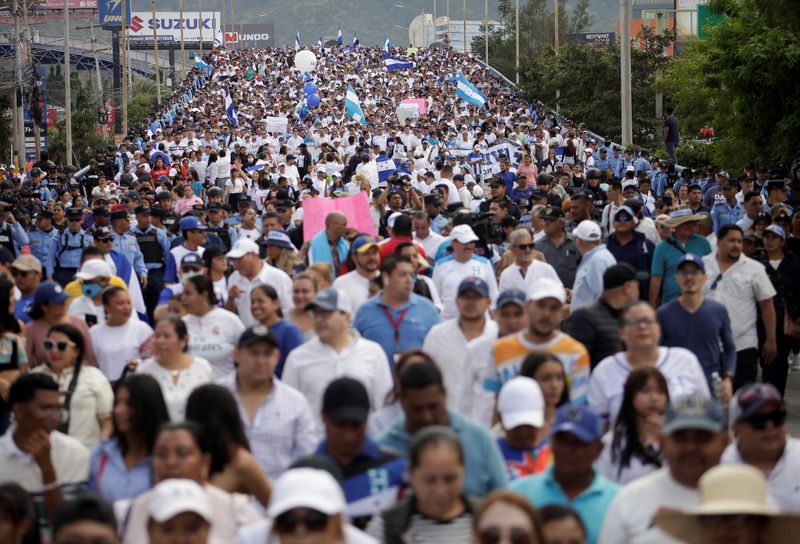Thousands in Honduras march in anti-government protest
2023.11.11 17:38
5/5

© Reuters. People march during an anti-government protest against Honduras’ President Xiomara Castro, in Tegucigalpa, Honduras November 11, 2023. REUTERS/Fredy Rodriguez
2/5
By Gustavo Palencia
TEGUCIGALPA (Reuters) – Thousands of people took to the streets of the Honduran capital on Saturday in anti-government protests against leftist President Xiomara Castro, angered by attempts to engineer what they say is an unconstitutional power grab.
In a demonstration sponsored by opposition parties, protesters in the Central American country accused the Castro government of seeking to transform Honduras by hand picking public officials.
“We are here in defense of democracy because we do not want a dictatorship in Honduras like those in Cuba, Venezuela and Nicaragua, which is what the leftist government of President Xiomara Castro is leading us to,” David Chávez, president of the right-wing National Party told reporters on Saturday.
Roughly 10,000 people gathered in Tegucigalpa, the capital, according to a Reuters eyewitness, in a march that ended without incident. An official estimate from the Honduran authorities was not immediately provided.
The opposition protest was sparked after the ruling party elected a new interim chief prosecutor on November 1, without holding a congressional vote.
Lawmakers with Castro’s Liberty and Refoundation Party (Libre) used a committee vote where their members make up a majority to secure the nomination, even though they represent a minority in the Congress overall. The opposition claims the move was unconstitutional.
The Honduran constitution stipulates that 86 votes from the 128-member unicameral legislature are needed to elect the attorney general, but it also gives the committee the power to pick an interim chief prosecutor if the post is vacant.
Castro, who was sworn in as Honduras’ first woman president in January 2022 and describes herself as a democratic socialist, has sought to strengthen diplomatic relations with the governments of Cuba, Venezuela and Nicaragua.








